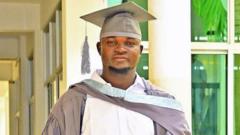Kenyan President William Ruto has sparked controversy following his announcement to build a $9 million church at the State House, claiming he will fund the project personally. This has reignited debates about the relationship between the church and state in Kenya.
Kenya's President Ruto Defends $9M Church Project at State House

Kenya's President Ruto Defends $9M Church Project at State House
President William Ruto announces plans for a large church at his official residence, provoking mixed reactions among Kenyans.
Kenyan President William Ruto is moving forward with plans to construct a grand church at the presidential residence in Nairobi, a project he insists he will finance personally. The announcement has fueled frustration among many Kenyans, who question the appropriateness of such an undertaking amid ongoing economic struggles and the country's secular constitution.
In comments made at State House, Ruto stated, "I am not going to ask anyone for an apology for building a church. The devil might be angry and can do what he wants." This remark has drawn criticism from various quarters, especially considering the significant financial implications at a time when many citizens are grappling with rising living costs.
Reports indicate that the church will have a seating capacity of around 8,000 and will feature ornate stained glass windows, as detailed in architectural sketches revealed by the Daily Nation, a prominent Kenyan newspaper. The projected cost of $9 million raises further eyebrows at a time when many are still adjusting to economic pressures.
Opposition to the project is palpable, with an MP penning an open letter arguing that Kenya is not a Christian state, emphasizing the need for respect towards its diverse religious population that includes Muslims, Hindus, and followers of traditional African religions. Notably, while Christians make up about 85% of the Kenyan populace, the lack of a mosque or temple at the presidential estate raises questions about inclusivity.
In defending his decision, President Ruto pointed out that a modest church previously existed at the State House, highlighting the need for a more appropriate place of worship. Ruto, known for his evangelical Christian background, has often invoked scriptural references during public appearances, contributing to his “deputy Jesus” moniker. However, such displays have alienated some citizens who are skeptical of his intentions.
As the president's plan progresses, debates continue over the implications of merging state resources with religious projects, underscoring the complexities of governance in a country marked by diverse faiths and socio-economic challenges.
In comments made at State House, Ruto stated, "I am not going to ask anyone for an apology for building a church. The devil might be angry and can do what he wants." This remark has drawn criticism from various quarters, especially considering the significant financial implications at a time when many citizens are grappling with rising living costs.
Reports indicate that the church will have a seating capacity of around 8,000 and will feature ornate stained glass windows, as detailed in architectural sketches revealed by the Daily Nation, a prominent Kenyan newspaper. The projected cost of $9 million raises further eyebrows at a time when many are still adjusting to economic pressures.
Opposition to the project is palpable, with an MP penning an open letter arguing that Kenya is not a Christian state, emphasizing the need for respect towards its diverse religious population that includes Muslims, Hindus, and followers of traditional African religions. Notably, while Christians make up about 85% of the Kenyan populace, the lack of a mosque or temple at the presidential estate raises questions about inclusivity.
In defending his decision, President Ruto pointed out that a modest church previously existed at the State House, highlighting the need for a more appropriate place of worship. Ruto, known for his evangelical Christian background, has often invoked scriptural references during public appearances, contributing to his “deputy Jesus” moniker. However, such displays have alienated some citizens who are skeptical of his intentions.
As the president's plan progresses, debates continue over the implications of merging state resources with religious projects, underscoring the complexities of governance in a country marked by diverse faiths and socio-economic challenges.



















